Posted by: Maryland ENT in General
Did you know that besides adults, children can also get sinus infections? Sinus infections in young children occur when their sinuses become blocked due to an infection and can’t drain properly.
Your child may be unable to communicate some of the symptoms they’re experiencing. That makes it essential to pay attention to common sinus infection symptoms.
Keep reading to learn more about sinus infections in children and how to treat them.
What is a Sinus Infection?
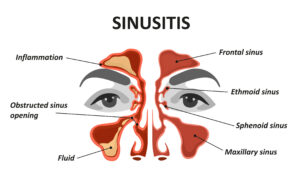
A sinus infection occurs when the tissue lining in your child’s sinuses becomes inflamed and swollen, preventing mucus from draining properly. Trapped mucus can allow bacteria and viruses to grow, leading to a sinus infection.
Allergies can cause sinus infections. Others begin as a viral upper respiratory infection or common cold. Cold symptoms that linger over ten days increase the risk of the cold becoming sinusitis.
In other cases, a sinus infection can be due to structural abnormalities like a deviated septum or nasal polyps.
Sinus Infections in Children
Children have small sinuses, which are present at birth. They include the ethmoid sinuses. The ethmoid sinuses are found between the eyes and the maxillary sinuses behind the cheeks.
Unlike adults, children’s sinuses do not fully form until their late teens. That makes them more likely to get sinus infections than adults.
Signs of a Sinus Infection
If your child has the following symptoms for more than 7 to 10 days, they might have a sinus infection:
Facial Pressure and Pain
You may notice your child touching their cheeks. If your child touches their cheeks more often, it can be caused by pressure in their sinuses.
Be on the lookout for signs of discomfort too. These could have links to sinusitis.
Fever
Because of invading bacteria, your child may develop a low-grade fever. A sinus infection can cause a fever of about 98.7°F to 100.4°F.
Your child may be sweating more than usual, and their forehead can feel warm to the touch. Use a thermometer to confirm if they have a fever.
Swelling and Tenderness
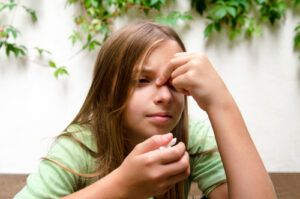
The sinuses located between the eyes can become inflamed due to a sinus infection. That inflammation may cause your child’s face to swell and become tender.
Swelling around the eyes that occurs all day and not just in the morning could be caused by sinusitis.
Cough
If your child has had a cough for more than ten days that worsens at night, it could be a sign of a sinus infection.
Fatigue
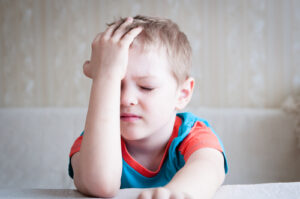
Symptoms of sinusitis in children mimic the common cold and include fatigue.
Runny Nose
If your child has a yellow or green discharge, it could signify sinusitis. If your child has a runny nose that lasts for more than seven days, that might be an indication of a sinus infection.
Congestion
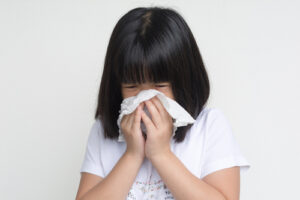
A stuffy nose could be a warning sign of sinusitis in children. Inflamed sinuses make breathing through the nose more difficult, forcing your child to use their mouth when they need to breathe.
Your child might not be able to convey exactly how they feel, but you can tell based on how they breathe or sound when talking.
Experiencing Post Nasal Drip
Glands in the lining of the throat secrete mucus to trap bacteria and viruses and protect the body. Typically, the mucus runs out of the nose.
It can also move down the back of the throat, which goes undetected.
But when there’s too much mucus produced, the excess mucus runs down the back of your child’s throat and is noticeable.
If this occurs, it’s called post-nasal drip. Post-nasal-drip is often a complication of sinusitis.
Post-nasal drip can lead to a sore throat. It can also irritate your child’s throat, causing them to need to clear their throat or cough more.
Your child may become grumpy or fussy if they can’t communicate this. Also, a hoarse voice from the irritation could point to a sinus infection.
Headaches
Headaches in children age six or older can be a tell-tale sign of a sinus infection. When your child’s sinuses are inflamed, they increase cranial pressure, which leads to headaches.

Crankiness
Children with sinusitis are usually irritable and might not eat or sleep well due to the discomfort they’re experiencing.
Bad Breath
Just like adults, children can experience bad breath on occasion. But if your child’s breath is unseemly regularly, they may have a sinus infection.
Sinusitis causes mucus to accumulate in the sinuses, making them the perfect breeding ground for bacteria. The excess mucus that’s infected flows from the sinuses and down to the back of the throat.
There, it meets the air your child exhales, and the rotten odor from the infection transfers to their breath.
Treatment for a Sinus Infection
The treatment for a sinus infection will depend on various factors, including the severity of your child’s sinus infection.
Acute Sinusitis
Acute sinusitis is often caused by a viral infection like a cold and might get better on its own. If it doesn’t, your child’s ENT specialist can prescribe antibiotics.
Acute sinus infections typically respond well to antibiotics. Symptoms should improve within the first few days of treatment.
Chronic and Recurrent Sinusitis
Chronic sinusitis occurs when the symptoms persist for at least 12 weeks. If your child has repeated episodes of sinusitis, around 4 to 6 per year, they have recurrent sinusitis.
Both chronic and recurrent sinusitis will need more advanced treatments like balloon sinuplasty or sinus surgery for long-term relief.
Balloon Sinuplasty
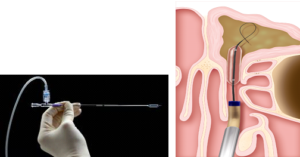
Balloon sinuplasty is a minimally invasive technique for your child with chronic or recurrent sinusitis. The surgeon inserts a tiny balloon catheter through your child’s nose during the procedure.
The balloon is inflated once in position. Inflating the balloon permanently widens blocked sinuses.
If there’s congestion, your ENT surgeon will use a saline solution to remove it. Your child should have significantly improved breathing after the outpatient procedure.
Sinus Surgery
Sinus surgery may be necessary if your child:
- Has chronic or recurrent sinus infections
- Develops polyps from allergies
- Has cystic fibrosis
Pediatric sinus surgery is performed to open the affected sinus cavities. It can also remove blockages like thickened mucous membranes, polyps, or cysts.
The procedure aims to restore normal drainage, which alleviates sinusitis symptoms.

Get a Long Lasting Solution for Your Child’s Sinus Infection
The trusted ENT specialists at Maryland ENT can help if your child has multiple sinusitis symptoms. We’ll provide an accurate diagnosis and the best possible treatment to address the root cause of their sinus problems.
Schedule an appointment at Maryland ENT in Baltimore and Lutherville, MD, today!



